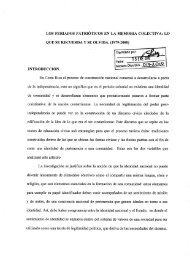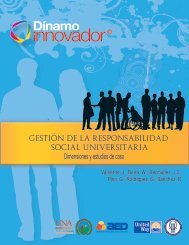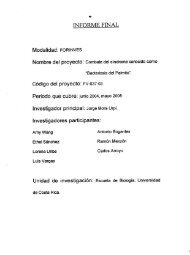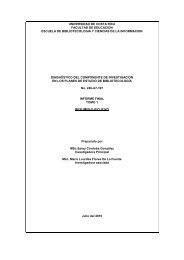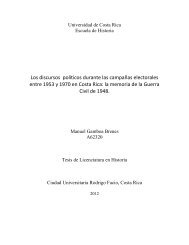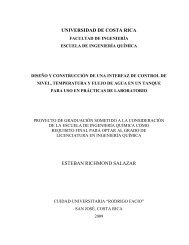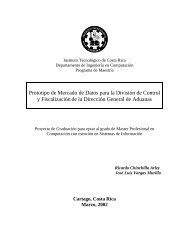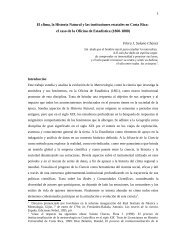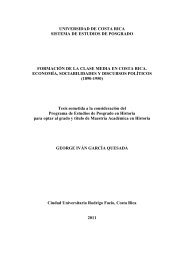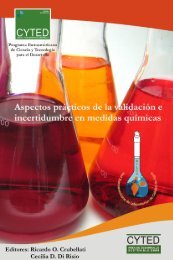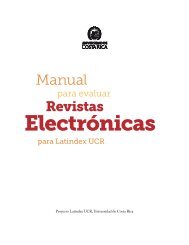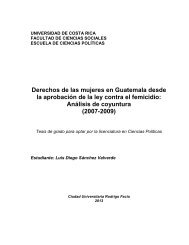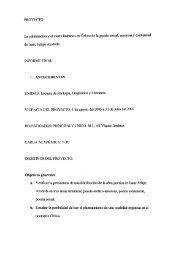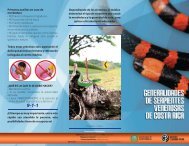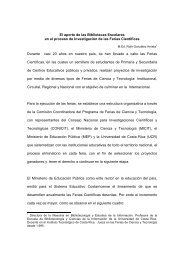A Raisin in the Sun
A Raisin in the Sun
A Raisin in the Sun
You also want an ePaper? Increase the reach of your titles
YUMPU automatically turns print PDFs into web optimized ePapers that Google loves.
Mama: (open<strong>in</strong>g her eyes and look<strong>in</strong>g <strong>in</strong>to Walter's) No. Travis, you stay right here. And you make him understand<br />
what you do<strong>in</strong>g, Walter Lee. You teach him good. Like Willy Harris taught you. You show where our five generations<br />
done come to. (Walter looks from her to <strong>the</strong> boy, who gr<strong>in</strong>s at him <strong>in</strong>nocently) Go ahead, son –(she folds her hands and closes<br />
her eyes) Go ahead (Hansberry, 1988: 147).<br />
Far from just be<strong>in</strong>g subjected to patriarchy, Lena actually becomes an agent and a force liberat<strong>in</strong>g<br />
her family from racial oppression. However, Lena also becomes an oppressor herself, for she exerts her<br />
power fiercely upon Beneatha:<br />
Mama: Now –You say after me, <strong>in</strong> my mo<strong>the</strong>r's house <strong>the</strong>re is still God. (There is a long pause and Beneatha stares at <strong>the</strong><br />
floor wordlessly. Mama repeats <strong>the</strong> phrase with precision and cool emotion) In my mo<strong>the</strong>r's house <strong>the</strong>re is still God.<br />
Beneatha: In my mo<strong>the</strong>r's house <strong>the</strong>re is still God.<br />
(A long pause.)<br />
Mama: (Walk<strong>in</strong>g away from Beneatha, too disturbed for triumphant posture. Stopp<strong>in</strong>g and turn<strong>in</strong>g back to her daughter)<br />
There are some ideas we a<strong>in</strong>'t go<strong>in</strong>g to have <strong>in</strong> this house. Not long as I am <strong>the</strong> head of this family (Hansberry, 1988: 51).<br />
S<strong>in</strong>ce Lena even resorts to physical violence to keep her power over her children (she slaps Beneatha<br />
and beats up Walter), she could be thought of as a hegemonic and also strongest power figure <strong>in</strong> <strong>the</strong><br />
family, but this is not <strong>the</strong> case, for Lena <strong>in</strong>deed feels <strong>in</strong> a lower position than that of her children: “They<br />
frightens me, Ruth. My children. [. . .] And <strong>the</strong> o<strong>the</strong>r [Beneatha] done commence to talk about th<strong>in</strong>gs I<br />
can't seem to understand <strong>in</strong> no form or fashion” (Hansberry, 1988: 52). Her fears and <strong>in</strong>security, far from<br />
plac<strong>in</strong>g her a strong leader <strong>in</strong> <strong>the</strong> family, highlight her vulnerability and lack of strength. From this<br />
perspective, Lena's powerful position and unquestionable authority become destabilized, which suggests<br />
that <strong>the</strong> traditional notion of power as dom<strong>in</strong>ation of someone else is nei<strong>the</strong>r constant nor monolithic.<br />
TRANSFORMATIVE POWER: A REDEFINITION OF POWER<br />
Traditional def<strong>in</strong>itions of power based on notions of b<strong>in</strong>ary opposites fail to fully assess <strong>the</strong><br />
dynamism and complexity of power because <strong>the</strong>y reduce power relations to oversimplified constructs. An<br />
analysis of such relations among <strong>the</strong> women of Hansberry's A <strong>Rais<strong>in</strong></strong> <strong>in</strong> <strong>the</strong> <strong>Sun</strong> exemplifies <strong>the</strong> <strong>in</strong>accuracy<br />
of traditionally understood power hierarchies, for it discloses easily overlooked power shifts and overlaps,<br />
and reveals <strong>the</strong> simultaneous presence and absence of power <strong>in</strong> <strong>the</strong> female characters <strong>in</strong> <strong>the</strong>ir power<br />
relations. In this light, a new def<strong>in</strong>ition of power becomes necessary, which echoes <strong>the</strong> claims of some<br />
fem<strong>in</strong>ist groups who state that current def<strong>in</strong>itions of power are to be revised. For example, Sarah Lucia<br />
Hoagland def<strong>in</strong>es power as “<strong>the</strong> power of ability, of choice and engagement. It is creative; and hence it is<br />
an affect<strong>in</strong>g and transform<strong>in</strong>g power but not a controll<strong>in</strong>g power” (1988:118). This k<strong>in</strong>d of power is<br />
Saravia Vargas, José Roberto. "From Power-over to Power-to: Power Relations of Women <strong>in</strong> Hansberry's A <strong>Rais<strong>in</strong></strong> <strong>in</strong> <strong>the</strong> <strong>Sun</strong>"<br />
Impossibilia Nº4, Págs. 34-51 (Octubre 2012) Artículo: Recibido 08/02/2012 - Aceptado 20/03/2012 - Publicado 30/10/2012<br />
48



